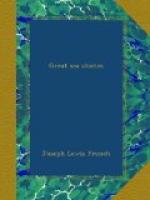I thought of him all that watch, as I kept scanning the seas. I should be going up and down, I thought, landing passengers through surf, or swaying bananas out of launches, or crying the sounds as we came to moorings. He would be going on under the stars, full of unquenchable hope, stumbling on the bones of kings. He would be wading across bogs, through rivers and swamps, through unutterable and deathly places, singing some songs, and thinking of the golden city. He was a pilgrim, a poet, a person to reverence. And if he got there, if he found El Dorado—but that was absurd. I thought of him sadly, with the feeling that he had learned how to live, and that he would die by applying his knowledge. I wondered how he would die. He would be alone there, in the tangle, stumbling across creepers. The poisoned blow-pipe, from the long, polished blow-pipe, such as I had seen in the museums. He would fall on his face, among the jungle. Then the silent Indian would hack off his head with a flint, and pickle it for the Lima markets. He would never get to the Caqueta. Or perhaps he would be caught in an electric storm, an aire, as they call them, and be stricken down among the hills on his way to Chito. More probably he would die of hunger or thirst, as so many had died before him. I remembered a cowboy whom I had found under a thorn bush in the Argentine. Paul Bac would be like that cowboy; he would run short of water, and kill his horse for the blood, and then go mad and die.
I was in my bunk when he went ashore at Payta, but a fellow in the other watch told me how he left the ship. There was a discussion in the forecastle that night as to the way the heads were prepared. Some said it was sand; some said it was the leaf of the puro bush; one or two held out for a mixture of pepper and nitrate. One man speculated as to the probable price the head would fetch; and the general vote was for two pounds, or two pounds ten. “It wouldn’t give me no pleasure,” said one of us, “to have that ginger-nob in my chest.” “Nor me, it wouldn’t,” said another; “I draw the line at having a corpse on my tobacker.” “And I do,” said several. Clearly the Frenchman was destined for a town museum.
It was more than a year after that I heard of the end of the El Dorado hunter. I was in New York when I heard it, serving behind the bar of a saloon. One evening, as I was mixing cocktails, I heard myself hailed by a customer; and there was Billy Neeld, one of our quartermasters, just come ashore from an Atlantic Transport boat. We had a drink together, and yarned of old times. The names of our old shipmates were like incantations. The breathing of them brought the past before us; the past which was so recent, yet so far away; the past which is so dear to a sailor and so depressing to a landsman. So and so was dead, and Jimmy had gone among the Islands, and Dick had pulled out for home because “he couldn’t stick that Mr. Jenkins.” Very few of them remained on the Coast; the brothers of the Coast are a shifty crowd.




